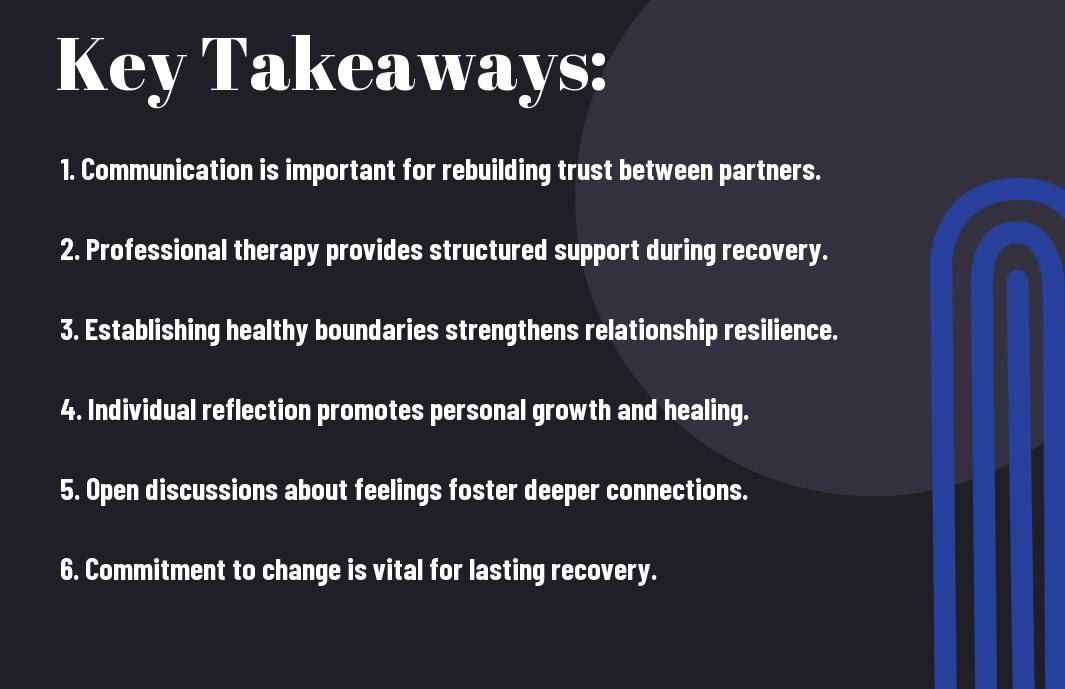There’s a path to healing after the overwhelming pain of sexual infidelity, and understanding effective recovery tools and therapy options can significantly aid you and your partner through this challenging journey. Infidelity can create deep wounds, but with commitment and the right guidance, you can rebuild trust and strengthen your relationship. This blog post will explore various recovery strategies, offering insights into individual and couple therapy, communication techniques, and the importance of establishing boundaries and emotional safety in your partnership.
Key Takeaways:
- Open and honest communication is necessary for processing feelings and rebuilding trust after infidelity.
- Therapy can provide a safe space for couples to explore underlying issues and address emotional wounds.
- Establishing boundaries and agreements is important for creating a sense of safety in the relationship.
- Working on individual emotional healing can be beneficial for both partners to navigate their personal feelings.
- Engaging in couples activities and reinvesting in the relationship can help to foster intimacy and connection.
- Understanding the reasons behind the infidelity can help both partners to gain insight and prevent future occurrences.
- Patience and commitment to the recovery process are key components in rebuilding a healthy relationship after infidelity.


Understanding Sexual Infidelity
To navigate the turbulent waters of sexual infidelity, it’s crucial to understand its complex nature. Infidelity transcends mere physical betrayal, often involving emotional connections that can disrupt the foundation of trust in a relationship. By comprehending the motivations behind infidelity, you can begin to address the root causes and foster healing.
The Impact of Infidelity on Relationships
Any act of infidelity can lead to significant emotional pain for both partners, resulting in fractured trust and a strained connection. The aftermath may evoke feelings of betrayal and insecurity, complicating efforts to rebuild the relationship.
Common Psychological Responses
Before you commence on the path to recovery, it’s vital to recognize the psychological responses that often accompany infidelity. You may experience a whirlwind of emotions such as shock, anger, grief, and confusion. Each of these feelings is natural but can hinder your healing journey if left unaddressed.
But acknowledging your responses is the first step toward transformation. As you process emotions like anger and betrayal, it’s important to understand that these reactions stem from a place of hurt and loss. You may also feel shame or guilt if you are the one who strayed, complicating your emotional landscape further. Seek support and give yourself space to feel these emotions authentically; this will empower you to navigate through the pain and emerge stronger on the other side.
Tools for Recovery
Any journey toward healing after sexual infidelity requires effective tools that foster understanding and trust. You will benefit from a combination of open communication, setting boundaries, and exploring therapy options. By implementing these tools, you can begin to rebuild the foundation of your relationship and ultimately emerge stronger together.
Communication Techniques
Below are some imperative communication techniques to help you engage more effectively with your partner. Active listening, expressing feelings without blame, and validating each other’s emotions are key strategies that create a safe space for dialogue. This approach empowers you both to articulate your thoughts while fostering empathy, paving the way for healing.
Setting Boundaries and Expectations
At the heart of rebuilding trust is the establishment of clear boundaries and expectations. Discuss with your partner what behaviors are acceptable and what are not moving forward to establish a sense of safety in your relationship.
Plus, defining boundaries also allows you to identify your needs and desires clearly, which can help in minimizing misunderstandings. This may involve honest conversations about physical and emotional intimacy, friendships, or even communication with others outside the relationship. Be proactive in setting these expectations together as this mutual agreement fosters a stronger connection, and ensures both partners feel respected and valued in the recovery process.
Therapeutic Approaches
Keep in mind that healing from sexual infidelity requires a multifaceted approach. Engaging in various therapeutic strategies can help you and your partner navigate the complex emotions and challenges involved in recovery. Each method may contribute differently to your healing journey, ultimately fostering understanding, trust, and intimacy in your relationship.
Individual Therapy for Partners
To facilitate healing, individual therapy can be beneficial for both partners. This setting allows you to explore your feelings, cope with pain, and understand the impact of infidelity on your mental and emotional health. Focusing on personal growth and self-reflection, individual therapy can uncover underlying issues that may have contributed to the relationship strain, equipping you with tools for healing.
Couples Therapy Strategies
Among the techniques used in couples therapy, effective communication, trust-building exercises, and empathy training play necessary roles. Therapy creates a safe space where you can openly express your emotions and experiences, fostering deeper connection. This environment allows you to tackle difficult conversations and rebuild trust, necessary for moving forward. You will learn to recognize each other’s needs and perspectives, creating a stronger foundation for your relationship.
For instance, during therapy sessions, you might engage in activities designed to enhance your communication skills, like active listening and sharing feelings without judgment. Additionally, you could partake in trust-building tasks that encourage vulnerability and honesty, which are key in overcoming insecurities. By practicing these strategies, you not only address issues stemming from the infidelity but also develop new patterns of interaction that promote a healthier relationship dynamic.
Building Trust After Betrayal
Despite the heartache caused by infidelity, rebuilding trust is possible and important for your healing journey. Trust is not regained overnight; it requires consistent effort, open communication, and a commitment to understanding each other’s emotions. Both partners must be willing to be vulnerable and engage in honest discussions about feelings, expectations, and boundaries to create a strong foundation moving forward.
Re-establishing Intimacy
By taking baby steps, you can gradually rebuild intimacy with your partner. Start by connecting emotionally through deep conversations and sharing your thoughts and fears. Once you have established a safe emotional space, explore physical intimacy at a comfortable pace, focusing on affection and closeness that fosters a sense of safety and trust.
Creating a Transparent Relationship
Along with rebuilding trust, creating transparency is vital. Open communication about feelings, needs, and daily activities establishes a sense of security. Discuss your personal boundaries, and don’t shy away from asking questions to clarify uncertainties. By fostering transparency, you both build a collaborative approach to the relationship.
But, transparency requires continuous effort and commitment from both of you. You must prioritize sharing not only your feelings but also your daily experiences, struggles, and achievements. This involves disclosing any potential triggers that may arise and actively addressing issues before they escalate. Engaging in honest communication and demonstrating your growth allows you to create a relationship based on trust and understanding, paving the way for a healthier bond.
Long-Term Growth and Maintenance
Your journey towards healing and rebuilding trust doesn’t end after initial recovery. Long-term growth and maintenance require commitment from both partners to foster a deeper understanding of each other’s needs and emotions. It’s imperative to continuously nurture the relationship by openly communicating, engaging in shared activities, and being proactive about addressing any lingering issues. This dedication will help create a more profound bond and ensure your relationship thrives in the long run.
Coping Strategies for Couples
Growth in your relationship post-infidelity involves developing effective coping strategies. Collaborative techniques such as active listening, setting aside time for regular check-ins, and practicing stress-reduction exercises can be immensely beneficial. Actively working together through challenges not only fortifies your connection but also enhances emotional intimacy.
The Role of Support Systems
Couples often find it beneficial to engage with support systems during their recovery phase. Surrounding yourself with trusted friends and family members who can provide emotional backing helps create a safe space for both partners to express feelings and gain perspective. These systems can also include professional therapy or support groups specializing in infidelity recovery, offering constructive advice and resources tailored to your unique situation. A strong support system can empower you to navigate your journey more effectively, reinforcing your resilience and enhancing your relationship’s robustness.

Case Studies and Success Stories
All couples experience challenges, but many emerge stronger after overcoming sexual infidelity. Here are some compelling case studies that highlight different paths to healing:
- Couple A: After 6 months of therapy, they reported a 75% increase in trust levels.
- Couple B: Engaged in weekly sessions for a year, resulting in a 90% improvement in emotional intimacy.
- Couple C: Utilized communication tools and saw conflicts reduce by 60% within 3 months.
- Couple D: Attended a workshop that led to a 70% increase in satisfaction with their relationship.
For more strategies to enhance your relationship, explore these Tools for Surviving Infidelity.
Examples of Overcoming Infidelity
Between couples who have faced infidelity, many have successfully navigated the tumultuous waters of betrayal by engaging in therapy, communication exercises, and rebuilding trust over time.
Lessons Learned from Recovery
To navigate the complex journey of recovery, couples often discover valuable lessons about vulnerability and resilience in the face of adversity.
Another significant takeaway from these experiences is the importance of establishing an environment where open communication can thrive. Couples learn that transparency about feelings and intentions lays the groundwork for renewed trust. Additionally, setting boundaries and respecting each other’s emotional needs can help prevent future infidelity. Effective management of emotional triggers and reaffirming commitment also play necessary roles in the recovery process. Overall, understanding what led to the breach and fostering a deeper connection can transform pain into a powerful, unifying experience.
Summing up
As a reminder, navigating sexual infidelity in your relationship can be challenging, but effective tools and therapy can facilitate healing and rebuilding trust. Engaging in open communication, setting boundaries, and seeking professional guidance are necessary steps in your recovery journey. You and your partner can gain insight into the underlying issues that contributed to the infidelity, allowing you both to cultivate a stronger, more resilient bond. Embrace this opportunity for growth and connection, ensuring a healthier relationship moving forward.
FAQ
Q: What is sexual infidelity recovery?
A: Sexual infidelity recovery refers to the process through which couples work together to heal their relationship after one partner has been unfaithful. This recovery process typically involves emotional healing, rebuilding trust, improving communication, and seeking professional guidance through therapy or counseling.
Q: What are some common tools used in sexual infidelity recovery?
A: Common tools for recovery include communication exercises, trust-building activities, emotional check-ins, and journaling. These tools help couples articulate their feelings, share their needs, and reinforce their commitment to each other. Additionally, resources like workbooks and guided discussions in therapy can be beneficial.
Q: How can therapy aid in the recovery from infidelity?
A: Therapy provides a safe space for both partners to express their emotions and frustrations. A trained therapist can facilitate conversations, help identify underlying issues that led to the infidelity, and guide couples in developing healthier communication patterns. Couples therapy also fosters empathy and understanding, which are necessary for mending the relationship.
Q: How long does the recovery process typically take?
A: The duration of the recovery process varies significantly and depends on the couple’s unique circumstances, including the severity of the infidelity and both partners’ willingness to engage in the process. Some couples may find resolution in a few months, while others may require a year or more of dedicated effort and support to rebuild their relationship.
Q: Is it possible to rebuild trust after infidelity?
A: Yes, it is possible to rebuild trust after infidelity, but it requires time, patience, and consistent effort from both partners. Open and honest communication, transparency, and accountability are key components in restoring trust. Both partners must work collaboratively to create a new foundation for their relationship and establish healthy boundaries moving forward.
